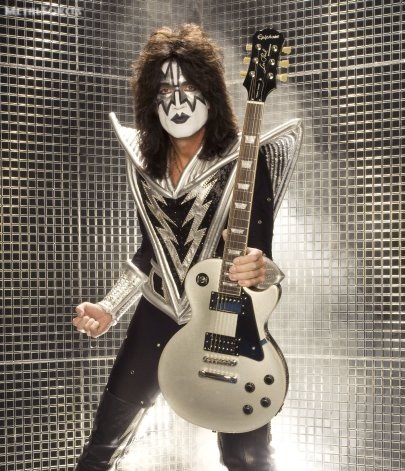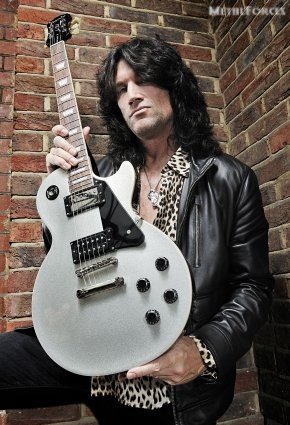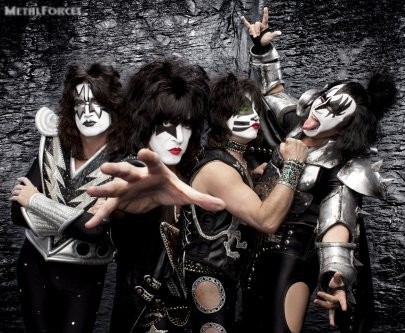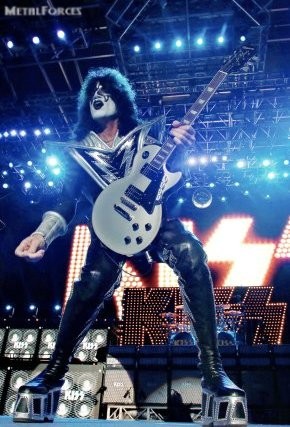
KISS – Outta This World
Anthony Morgan
January 2013

|
A member of American hard rock outfit Kiss since March 2002, lead guitarist ‘Spaceman’ Tommy Thayer has favoured the use of Les Paul Standards for the most part, the majority of which have been reissues crafted by the Gibson Custom Shop. A 2006 decision would plant the seeds for the January 2013-released Tommy Thayer ‘Spaceman’ Les Paul Standard Outfit, an Epiphone creation limited to a 1,000 replicas.
“In 2006 I decided I wanted to mix it up and have them try something else with a different aesthetic, a different top on it rather than a Sunburst,” Tommy remembers. “I thought doing a silver sparkle top would be great for a Les Paul, and would be great onstage with Kiss obviously. I thought it would look great with the outfits and the stage show we do and everything, and the lighting (laughs). I asked them to make one in the actual Gibson Custom Shop.
“We were doing a show in Las Vegas (Nevada) called VH1 Rock Honors (May 25th), which was a special commemoration to Kiss. I was excited to get the guitar, because I thought ‘Oh great. I’m gonna play this guitar onstage, and debut it on this VH1 Rock Honors show.’ This was in 2006. The silver top guitar from Gibson showed up at the hotel. I was excited to see it because I wanted to play it that night, but I opened it up and said ‘Well, that’s odd. This thing looks really weird, actually.’ I wasn’t happy because they made it with the silver sparkle top, but the sides and the back of the guitar were just mahogany wood like a gold top. It was strange, so I immediately called them up and said ‘You know what we should do? We should make the sides and the back of the neck black. With the silver sparkle top, that would look fantastic.’ I sent it back. They took a couple of weeks, redid it, I got the guitar back, and that was it. It was really what I wanted then.
“I’ve had that guitar for six years now and played it a lot onstage with Kiss, particularly in my guitar solo – it’s been featured in parts of the show like that. A year or two ago I contacted Epiphone, which is really a part of Gibson, the same company. I met and talked to Jim Rosenberg the president, and told him I would love to do a Tommy Thayer limited edition Les Paul signature guitar. He loved the idea. The reason I went to Epiphone and not Gibson is because I wanted to make a signature guitar that was high quality, had great playability, was well made, had great performance, but was also something that was completely affordable for everyone. That’s why we’ve done an Epiphone, and that was my preference from the beginning.
“Jim and I just deal directly with each other; we don’t have any intermediaries. We just talk on the phone, and email. I just sent him the exact specs for that original silver sparkle top that the Custom Shop had done for me in ’06. Jim made the point that it was important we replicated the guitar exactly right down to the detail of the same tuners, the exact same pickups, the same parts, bridge, all the details being exactly the same as the original guitar. He said that fans really scrutinise that, and want replica guitars exactly like the originals. That’s what we did; we made an exact replica of the original one, and it turned out great. We actually ended up using Gibson 498 pick-ups, Grover Deluxe tuners, all the exact same parts.

|
“It’s really well put together with great parts, and the guitar sound is incredible. It sounds as good as the Gibson. I’m really pleased with that, and the other thing that’s great about it is that it’s affordable. Also, I didn’t want to stylise it too much. The silver sparkle top is great; it’s very Kiss. It’s a classic guitar, but it’s also a guitar that will capture the eye of any guitar player that walks into the guitar shop and wants a cool looking guitar. It works both ways and that was important to me as well, that it wasn’t too stylised as a Kiss guitar necessarily.”
Live performances scheduled in support of October 2012 studio full-length Monster commenced on November 7th in Buenos Aires, Argentina, Epiphone’s ‘Spaceman’ Les Paul Standard Outfit a nightly feature. “We just finished our South American tour in November, and I used it every night on that South American tour,” the axeman recalls. “Not for the whole set, but for several songs in the set I was using the Epiphone signature guitar. Again I’m not just saying this, but it performed perfectly. The intonation was perfect, the tuning was amazing, and the sound and performance of the guitar was incredible. I was really pleased. It put a big smile on my face, because sometimes I wondered ‘Well, is this gonna stand up to the Gibson?’ It absolutely does. And again, the great thing is it’s a totally affordable guitar that anybody can get their hands on.
“The other cool thing about the package of the guitar is that not only do you have the guitar but it comes in a plush, all silver hard shell custom case, and you don’t see those very often. It also comes with a custom leather, studded, black and silver guitar strap, and that’s an exact replica of the guitar strap I use onstage with Kiss as well. Then there’s a cool little certificate of authenticity that comes in the guitar case too, with my signature and photo on there with the serial number and everything. It’s a really nice package – Epiphone’s done a great job with it.”
January 2013 box set The Casablanca Singles: 1974-1982 collects all of the 29 Kiss singles to be originally issued through Neil Bogart-founded label Casablanca Records, many of which Kiss still perform live to this very day. “My favourite early Kiss material is the first three albums (February 1974’s Kiss, October 1974’s Hotter Than Hell, and March 1975’s Dressed To Kill),” Tommy cites. “The first four albums I should say, including Alive! (September 1975). Anything on any of those records is just phenomenal stuff. The band was new, the band was raw, and you can hear it in the singing. You can hear it in the guitar playing; Ace (Frehley) was at the top of his game on those first three to four albums. There’s no question about it.
“That’s really where I cut my teeth when I was starting to play guitar. I’ve been playing all of those tunes for almost 40 years now (laughs), and that’s why I know them so well. Really though, some of my favourite stuff is off of our new album Monster. The guitar playing on that and the guitar solos are something that I’m very proud of. I really came out of my shell on this. It’s very in-your-face, and the guitar playing and the album itself is something that we’re all very proud of and very excited about. I’m looking forward to everybody hearing that.”
Performing pre-existing licks, the axe-slinger doesn’t opt to deviate away from original renditions. “Whether it’s Ace or any of the other guitar players that wrote and recorded guitar parts on the Kiss records, I want to try to play them as faithfully as I can to the way they were originally written and recorded,” he divulges. “I think that most fans and most people who go to the concerts want to hear them that way. I know that when I go to see a show, I want to hear those songs played the way that I know them. It’s always disheartening when you see maybe a new guitar player come into a situation or into a band that you like and you’re seeing them live in concert, and he’s not faithful to the parts. It’s not as good to me that way, and I’ve never liked that as much. I’ve always tried to get that stuff as close as I can to the originals, because that’s the way it’s supposed to be and that’s the way it’s supposed to sound.”

|
The preferred songwriting approach for Monster was an extremely simple one. “We would get together as a band, or with two people from the band or maybe even three people from the band getting together,” Tommy explains. We’d just sit down in somebody’s house, or in somebody’s hotel room on the road. We’d literally sit down, and go ‘Okay, how about this riff?’ ‘Oh, I like that.’ ‘Cool.’ ‘Let’s build on that. How about if I add this?’ ‘Great. Love it.’ It goes on from there. It’s a very simple, organic approach to writing. We didn’t use any outside writers nor did we allow any outside writers, so it’s all pure, 100% band written.
“We didn’t do demos either, so when we would actually sit down – like I said, at somebody’s house or in a hotel room – we would just literally have our iPhone handy. We’d use the Voice Memo function to record an idea, once we had a basic song idea worked out. Then the next step would be to organise rehearsals. We’d go to the rehearsal room, and show everybody else in the band the song. We’d work out the exact arrangement, and then we’d go to the recording studio and record the song for the album. There was no fat in the process; it was all lean the way we approached it. There were no demos, so you go in when you’re actually recording the song for the first time. The real feeling and spirit of the song comes out, rather than trying to recreate it because you did a demo and already went through that step. Everything was just true to form. We recorded very simply and faithfully to the song as it was written, and that’s the best way to do it.”
The novelty of using outside songwriters has fallen out of fashion within the Kiss camp. “I don’t think it’s just as far as Kiss is concerned, but as far as many bands in popular music,” the guitarist notes. “In the 80s with the beginnings of MTV and the video revolution, I think that bands and artists began to take a slightly different approach to writing. It was about creating something that was going to work well and sell well on video, on MTV and on radio. Therefore, the idea of bringing in outside writers was popular then because you wanted to write songs that were more single-oriented and more hit-oriented. The success of a band depended on that; being on MTV and on the radio, you had to have hit songs one way or another if you wanted to succeed. I think it’s evolved now where bands and artists don’t find that to be the most important thing anymore, and it’s not what drives the process like it used to in the 80s. Now it’s more organic again, where we just write songs because we love the music. We love the raw, rock ’n’ roll, rootsy songs that we’re writing. That approach was just simpler and more honest, actually. It’s more real, more what we really are. In that regard, I like that better.”
October 2009’s Sonic Boom was Tommy’s first proper Kiss studio outing. “Sonic Boom was an important step in the evolution of Kiss,” he submits. “Kiss hadn’t recorded a studio album since Psycho Circus (September 1998), which had been 11 years. For many of those years Paul and Gene were hesitant to even record a studio record, just because it didn’t seem like it was worth the time and energy. Since this current line-up of the band got so good in the last five to six years, they decided that we should record an album. That was because the band’s so great, because the tours were so successful, and because the band was performing so well live. There’s a new excitement and a new spirit to what we’re doing. Sonic Boom was the first one after 11 years, and it really tested the waters to see if we could make a great record. Sonic Boom was a little more patterned after earlier classic Kiss records. We tried to do a really cohesive Kiss record, and that’s what we did. We did a great job, but again, it was about not trying to reinvent the wheel. It was more about being faithful to the classic Kiss records, and trying to do a record that has a lot of cohesion and sounded like a real Kiss record. A lot of the studio albums prior to that didn’t have that cohesion, and were kind of all over the place in a lot of ways stylistically.”

|
Monster includes nine songwriting credits attributed to the axeman, its predecessor Sonic Boom including a comparatively modest three (‘Never Enough’, ‘I’m An Animal’, and ‘When Lightning Strikes’). “More songwriting credits for me was just a natural progression,” he remarks. “It’s just a matter of being more involved as time goes on, more into the swing of it, feeling more comfortable, and all those things. It’s a natural kind of progression, and I’m happy to be doing more of that certainly.”
‘Outta This World’ aside, all of Tommy’s songwriting contributions were of a collaborative nature. “It’s interesting writing with Paul and Gene, but I think I wrote more with Paul for whatever reason,” he observes. “Paul and I would get together quite often, and work out song ideas. It’s really inspirational for me, because Paul is a guy that has been doing this for a long time. He’s very experienced and very smart about his approach to songwriting, and just influences in general. People don’t realise it, but Paul and Gene are huge rock fans as well. They love the rock music that they grew up with, and that’s still very much a part of what influences them when they’re writing. I’ve learnt a lot from them because a lot of the stuff that they’re influenced by was a little before my time. They’ve turned me on to a lot of great bands from the late 60s that I wasn’t privy to because it was before I was aware of what was going on (laughs). I came into music more in the early to mid 70s because I’m a little younger. Learning from them and enjoying a lot of the things that they love has been a great experience. It’s just phenomenal.”
A successor to Monster would be hugely welcomed by Kiss fanatics. “We take one day at a time here,” the axe-slinger cautions. “I could see that happening again possibly in the next year or two, but nothing has definitely been decided on. It’s a lot of fun and a great experience to record with these guys, which is actually unique in a lot of ways because most bands don’t enjoy spending time and working together like we do. I know people say ‘Oh, he’s just saying that,’ but it’s true. We really enjoy working together, and recording and writing. With that in mind I can see it happening more, but again, there’s nothing planned yet. I hope we do some more recording and writing, and put out another record. I think it would be just another step in the Kiss story, and something I’d look forward to.”
Monster was released in Europe on October 5th, 2012 and subsequently on the 9th in North America, all via Universal Music.
Interview published in January 2013.





